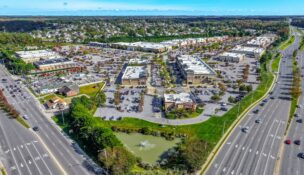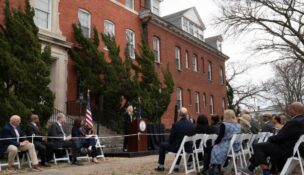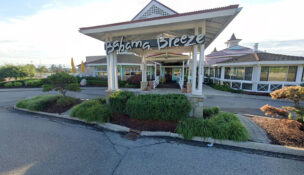Hampton Roads State of the Region report offers sobering look at COVID-19 impacts
Employment, hotel occupancy, import tonnage, market share fell
Sydney Lake //October 6, 2020//
Hampton Roads State of the Region report offers sobering look at COVID-19 impacts
Employment, hotel occupancy, import tonnage, market share fell
Sydney Lake //October 6, 2020//
Old Dominion University‘s Dragas Center for Economic Analysis & Policy’s 2020 State of the Region report for Hampton Roads offers a sobering look at how the pandemic has harmed the regional economy and left tens of thousands of Hampton Roads residents jobless.
Employment in Hampton Roads fell dramatically, hotel occupancy continues to be outpaced by 2019 after bottoming out in April and import tonnage and market share at the Port of Virginia dropped this year. Full recovery from COVID-19 is likely to take years, according to ODU’s latest annual report about the regional economy, which was released Tuesday.
In April, individual employment fell by 11.6% in Hampton Roads. By June, 59,000 fewer residents were employed, as compared to just three months earlier. Regional COVID-19 job losses eclipsed those seen during the 2007-2009 Great Recession. In April, 77,000 Hampton Roads residents filed initial unemployment claims, which were seven times greater than the peak of the Great Recession, according to the report. And the impact is being felt disproportionately by minority communities, including African Americans and Hispanics.
“While the region’s dependence on direct federal spending (particularly through the Department of Defense) helped insulate Hampton Roads from some of the worst effects of COVID-19, the other two ‘pillars’ of the local economy – tourism and the Port of Virginia – dramatically felt the impact of the pandemic,” the report states.
Although hotel occupancy and revenues have slowly crept up in recent months, regional occupancy bottomed out at 31% in April. (In April 2019, the region’s hotel occupancy rate was 70%.) For the week of Sept. 20 through Sept. 26 (the most recent week of statistics available), hotel revenues in Virginia decreased by 47% and rooms sold declined by 29% compared to the same week last year, according to the Dragas Center. This was a major hit for the region that was expecting a hotel revenue boost from the canceled Something in the Water music festival, which in 2019 sold 35,000 tickets and drew crowds of 12,000 to 15,000 people each day during the three-day event.
Additionally, import tonnage at the Port of Virginia declined 17.3% between June 2019 and June 2020. Its cargo market share dropped from 16.5% to 16.2%, when comparing the first five months of 2019 to the same time interval in 2020.
Despite some signs of recovery since the onset of the pandemic, the report suggests that Hampton Roads is still projected to report a negative economic growth for 2020. Robert McNab, director of ODU’s Dragas Center, suggests that the region should not expect a quick recovery from COVID-19, noting that full employment recovery from the Great Recession took nearly a decade.
“We must reimagine what recovery will look like in a changed world,” McNab said in a statement. “This is a time to question assumptions and old ways of doing things. How can the region thrive in a world where people wear masks, keep their distance and, in many cases, operate virtually?”
On top of the COVID-19 challenges detailed in the report, ODU’s 2020 State of the Region report included five additional chapters providing information about Great Recession Recovery, mental health, food insecurity and the Thomas Jefferson National Accelerator Facility in Newport News.
Below are highlights:
- The Way We Were: 2010-2019 – A look at how Hampton Roads struggled following the Great Recession. “The last decade, however, might be characterized as one in which Hampton Roads was largely left behind. The nation and Virginia grew faster than the region. More jobs were created elsewhere. While Virginia was ‘open for business,’ it seemed that Hampton Roads was on the outside, looking in.”
- Anxiety and Stress in the Workplace – The estimated $1 billion in lost productivity and health care expenses connected to mental health issues in 2019 is projected to grow this year. “Approximately 70% of workplace anxiety and stress costs arise from lost productivity (e.g., sickness absence, leaving the workforce early) and about 30% come from direct medical costs borne by health care systems.”
- Food Insecurity in Hampton Roads – One in 10 residents of the region were unsure of the source of their next meal in 2018. “Food insecurity is highly sensitive to the business cycle. Yet, even though a record number of Americans were working, food insecurity remained persistent for more than 1 in 10 households.”
- Youth Mental Health in Hampton Roads – More young people, particularly teenagers, report rising levels of anxiety and depression. “The COVID-19 pandemic, the closure of schools due to stay-at-home orders and the ongoing economic recession have thrown this crisis into sharp relief.”
- Jefferson Lab – A January 2019 study of the Thomas Jefferson National Accelerator Facility in Newport News estimates that the laboratory’s 2018 fiscal year regional economic impact was $269.2 million in economic output, resulting in $149.2 million in labor income and 2,015 jobs.
a



















